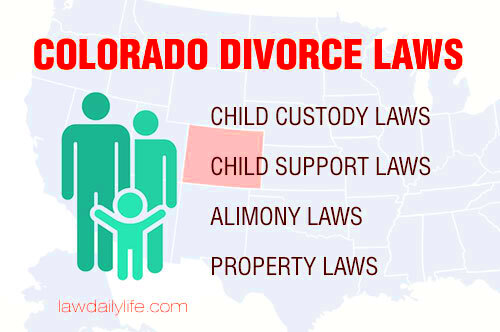Colorado Divorce Laws and the Division of Property Explained
Divorce can be a complex and emotional journey, especially when it comes to understanding the laws that govern it. In Colorado, divorce laws aim to ensure a fair process for both parties. The legal system recognizes that every divorce is unique, which is why it’s essential to grasp the fundamental concepts of Colorado divorce laws. Whether you’re contemplating divorce or are already in the process, knowing your rights and obligations can help you navigate this challenging time more effectively.
Grounds for Divorce in Colorado

In Colorado, the primary ground for divorce is irretrievable breakdown of the marriage. This means that the relationship is beyond repair, and both parties agree that the marriage cannot continue. Here are the key points regarding grounds for divorce in Colorado:
- Irretrievable Breakdown: Most common reason, requires one party to state that the marriage is over.
- Separation: If the couple has lived apart for at least 91 days before filing, this can also serve as grounds for divorce.
- Fault Grounds: Colorado is a no-fault state, meaning that fault grounds like adultery or abuse are not typically considered during the divorce process.
Understanding these grounds is crucial because they can affect how the divorce is processed and the decisions made regarding property and custody.
How Property is Classified in Colorado

In Colorado, property classification plays a significant role in divorce proceedings. The law categorizes property into two main types: marital property and separate property. Here’s a breakdown of each:
| Type of Property | Description |
|---|---|
| Marital Property | Any property acquired during the marriage, regardless of whose name is on the title. This includes assets such as homes, vehicles, and income. |
| Separate Property | Property owned by one spouse before the marriage or acquired by gift or inheritance during the marriage. This property is generally not subject to division. |
Understanding the distinction between these types of property is vital for a fair division during a divorce. Courts will typically divide marital property equitably, taking into account various factors, while separate property remains with its original owner.
The Process of Property Division

Property division in a divorce can feel overwhelming, but understanding the process can ease some of that stress. In Colorado, the law follows the principle of equitable distribution, meaning that marital property is divided fairly but not necessarily equally. Here’s a breakdown of how this process typically works:
- Identification of Property: The first step is identifying all marital assets and debts. This includes everything from houses and cars to bank accounts and credit card debts.
- Valuation of Assets: Once identified, each asset must be assigned a fair market value. This may require appraisals for significant items like real estate.
- Negotiation: After valuing the assets, spouses may negotiate how to divide them. This can be done directly or through mediation.
- Final Agreement: If an agreement is reached, it is documented and submitted to the court for approval. If not, the court will make the final decision.
Keep in mind that debts are also divided in this process. Understanding this sequence can help you prepare for discussions and negotiations.
Factors Influencing Property Division
Several factors come into play when determining how property will be divided in a Colorado divorce. While the court aims for fairness, different circumstances can lead to varying outcomes. Here are some key factors that can influence property division:
- Length of Marriage: Longer marriages may lead to more equal division of assets.
- Contributions to the Marriage: Both financial and non-financial contributions, like homemaking or childcare, can affect division.
- Economic Circumstances: The financial situation of each spouse post-divorce can influence asset division.
- Child Custody Arrangements: Courts may consider custody arrangements when deciding on the division of property.
Understanding these factors can give you insight into what to expect during negotiations and court proceedings.
What is Marital Property vs Separate Property
Knowing the difference between marital property and separate property is crucial when going through a divorce in Colorado. Here’s a clearer look at both categories:
| Type of Property | Description |
|---|---|
| Marital Property | Property acquired during the marriage, regardless of how it’s titled. This includes income, real estate, and retirement accounts. |
| Separate Property | Property owned by one spouse prior to marriage or acquired during the marriage through inheritance or gift. This property is typically not divided. |
Understanding these distinctions can help you protect your rights and assets during the divorce process. If you’re unsure about specific items, consider consulting a legal professional to clarify your situation.
Understanding Maintenance and Alimony
Maintenance, commonly known as alimony, is an essential aspect of divorce in Colorado. It refers to the financial support one spouse may be required to pay the other after separation or divorce. The goal of maintenance is to help the lower-earning or non-working spouse maintain a similar standard of living as during the marriage. Here’s what you need to know about maintenance and alimony in Colorado:
- Types of Maintenance: There are two main types: temporary and permanent. Temporary maintenance is awarded during the divorce process, while permanent maintenance may be awarded after the divorce is finalized.
- Factors Considered: Courts look at several factors to determine the amount and duration of maintenance, including:
- The length of the marriage
- The financial resources of both spouses
- The standard of living established during the marriage
- The age and physical/emotional condition of both spouses
- Each spouse’s contribution to the marriage
- Duration of Payments: Maintenance can be temporary, short-term, or long-term, depending on the circumstances. Generally, longer marriages may lead to longer maintenance periods.
Understanding these aspects of maintenance and alimony can help you plan for your financial future after divorce.
Frequently Asked Questions
Many individuals have questions about divorce and property division in Colorado. Here are some common inquiries that may help clarify the process:
- What is the difference between alimony and child support?
Alimony is financial support for a spouse, while child support is specifically for the care of children. - Can I modify my maintenance payments?
Yes, if there’s a significant change in circumstances, such as a job loss or change in income, you can request a modification. - How is marital property divided?
Marital property is divided equitably based on various factors, including the length of the marriage and contributions of each spouse. - Do I need a lawyer for my divorce?
While it’s not mandatory, having a lawyer can help navigate the complexities of divorce and protect your rights.
If you have more specific questions, consider reaching out to a legal professional for personalized advice.
Conclusion
Navigating divorce laws and property division in Colorado can be complex, but understanding the key elements can make the process smoother. From recognizing the difference between marital and separate property to knowing how maintenance works, being informed is your best tool. Remember that every divorce is unique, and it’s crucial to approach your situation with the knowledge and support you need. Whether you’re going through the divorce process or just beginning to consider it, take the time to research and consult professionals when necessary. A fair outcome is possible with the right preparation and understanding.


